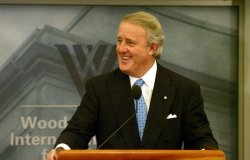Book Launch: <i>America's Army: Making the All-Volunteer Force</i>
Author Beth Bailey, Professor of History, Temple University; Judith Stiehm, Professor of Political Science, Florida International University; Lawrence Korb, Senior Fellow, Center for American Progress
Overview
Author Beth Bailey, Professor of History, Temple University; Judith Stiehm, Professor of Political Science, Florida International University; Lawrence Korb, Senior Fellow, Center for American Progress
During a time when the United States military is fighting two wars simultaneously, scholars, military veterans, and members of the general public discussed the origins of today's army on November 16 as part of the launch of Beth Bailey's new book, America's Army: Making the All-Volunteer Force.
The book begins, Bailey explained, with the crisis year of 1968. The Tet Offensive demonstrated that the government had not been forthcoming about the prospects for victory in Vietnam, and the assassinations of Martin Luther King and Robert F. Kennedy had increased political tensions across the country. These events coincided with a "perfect storm" of opposition to conscription. On the left, many considered the draft inequitable, as deferments for students, fathers, and other protected categories pushed the burden of war toward the nation's least privileged. Moreover, liberals believed the draft encouraged military adventurism. But opposition to the draft also came from the right: conservatives and libertarians saw compulsory service as a betrayal of American values of freedom and limited government. A group of free-market economists argued that turning to the market could improve the military.
Two weeks before the 1972 presidential election, in an attempt to show bold leadership and undercut his opponent, Richard Nixon announced his promise to end the draft. With Congressional approval, the army moved to all-volunteer status in 1973 and as a result, faced the challenge of recruiting twenty to thirty thousand people per month at a time when most Americans held the service in low regard. Morale was low, the leadership was in crisis, and discipline had collapsed, with drug use running rampant within the ranks. A poll revealed that seventy percent of soldiers would not recommend service to relatives or friends.
The chief argument of her book, Bailey said, was that the shift to the market compelled changes in American ideas about who should serve and what military service meant. Officials had to think of prospective recruits as consumers and ask themselves, What do younger people want? What kinds of messages would motivate the best people to apply? How could the army use benefits to attract and retain the best applicants? In response, they decided to portray military service not as an obligation, but as an opportunity. Their decision had profound implications for the army. For one thing, the army's demographic profile shifted toward a greater proportion of female, married, and older soldiers, complicating its ability to sustain extended deployments overseas. It also increased pressure to accept lower-qualified applicants, as it was politically difficult to deny opportunities to the segments of the American population that most needed them.
Bailey explained that certain policies have undercut the army's ability to wage the present wars in Afghanistan and Iraq. For example, the decision to put important jobs in the National Reserves, predicated on the notion that the army would not go to war without these positions, has meant that the Reserves have been used more heavily than anticipated. (At one point, the number of Reserves outnumbered the general army in Iraq.) Furthermore, the shift to high-tech weaponry to compensate for smaller troop sizes has resulted in the United States occupying territory that it has not completely conquered.
America's Army is, according to Bailey, intended to reach three audiences. Mainstream historians ought to pay more attention to military topics, she said, especially given the present trend toward institutional analysis. Furthermore, the Army's story had significant implications for the history of civil rights and other political topics. The general public would benefit because over the years fewer and fewer Americans have acquired any direct knowledge of the military, a situation that prevents them from understanding the burdens that have fallen on a small subset of the population. Finally, the military could augment its existing historical programs with a study that takes social context into greater consideration.
Commentator Judith Stiehm said that Bailey's book highlighted the need for greater education about the military. Citizens have the responsibility for the type of army the nation has and how that army is used. Consequently, civics education should include substantial discussions about the role of the military in American life.
However, Stiehm criticized Bailey for neglecting of the cost of the all-volunteer military. America's Army focuse on how the Army attempted to recruit the best soldiers and the implications of these decisions. But, Stiehm pointed out, recruitment is expensive, and the use of contractors requires increased outlays relative to the use of Army personnel.
Commentator Lawrence Korb placed Bailey's findings in the broader context of U.S. military strategy. The shift to an all-volunteer army, he said, rested upon four pillars. First, the Army would remain relatively small because of cost and difficulty of recruiting larger numbers of soldiers. Second, private contractors would make up the shortfall in personnel by providing food, maintenance, and other services (including, more recently, actual soldiers). Third, the National Guard and Reserve would serve as a "bridge to conscription" in that their mobilization would spark resistance and thereby spur greater deliberation about military commitments. Finally, draft registration would provide an emergency supply of soldiers for times of extreme stress.
Given these principles, our present use of the all-volunteer military is unethical, Korb said. Government officials had promised soldiers they would spend two years at home for every year of combat, but the stress of two simultaneous wars has resulted in longer and more frequent deployments. If we do not use the fourth pillar, volunteers will suffer more than they should.
By Michael Easterly,
Sonya Michel, Director, United States Studies
Thank you for your interest in this event. Please send any feedback or questions to our Events staff.










